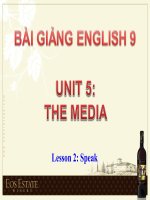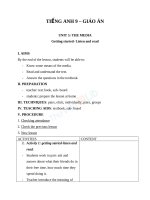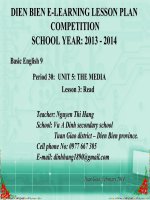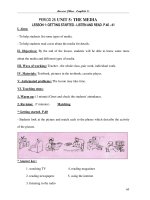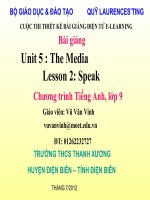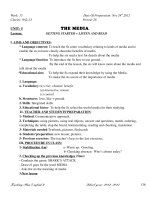Giáo án Tiếng Anh 9 Unit 5: The media
Bạn đang xem bản rút gọn của tài liệu. Xem và tải ngay bản đầy đủ của tài liệu tại đây (116.63 KB, 17 trang )
GIÁO ÁN TIẾNG ANH 9
Unit5: the media
Lesson 1: Getting started & Listen and read
I/The aims of the lesson
-To help ss getting started with the unit 5 & reading the text for details about the
media.
Listening to the text and completing the table
*Vocabulary: - interactive, remote,channel,crier , benefit, control.
*Grammar: gerund after some verbs,passive voice.
*Skill:-Main skils: Listening,Reading
-Other skills: speaking, writing
II/The objective of the lesson
-By the end of the lesson, students will know more about the media,understand the
gerund & passive.
III/Teaching aids
Radio,textbook,pictures,tape.
IV/Procedure
1.Warm up
*Getting started
* Chatting
-Hang picture,ask some questions.
What is he doing?
...................
Ss work in pairs & practice asking & answering the qs in the book
A:Which of these is your favorite activity in your freetime?
B:Watching TV
A:How many hours a week do you spend watching TV?
B:About 4 or 5 hours,I guess.
2.Preteach vocabulary
-to invent: phat minh
(Tran)
- interactive( adj) : tương tác
( example)
- remote(adj) :xa xôi
( SYN)
- channel(n): kênh
( translation)
- crier ( n) :
( picture)
người rao hàng
- benefit(n) : lợi ích, phúc lợi
( translation)
- control (v) : kiểm soát, điều khiển
( definition)
* Check: ROR
3.Pre reading
• Ordering statements prediction;.
1. Television is a cheap and convenient entertainment.
2. Vietnamese enjoy reading “ kiến thức ngày nay”, one of the most popular
magazines.
3. Long time ago, criers had to shout the lastest news as they were walking in the
street.
4. Interactive is the development of TV.
T; Asks Ss to work in pairsto put the statements in correct order.
Ss: Work in pairs
-T: - Gets feedback.
4.While reading
- T: -Asks students to read the text about the media and check their guesses
* Answer:
1.- c
2- b
3- a
4- d.
T: Gets Ss to work individually then share with their partners
Ss : Work individually *Answer keys:
Facts and events
1. Remote controls are used to
Passage number
D
interact with TV
2. One of the most popular
magagine.
B
B
3. People of different ages likes this
magagine.
C
4. Benifit of TV.
A
5. People got the news from town
crier.
D
6. Interactive TV is available now.
• Comprehension questions :
T: Asks Ss to work in pairs to answer the questions in Ex 2b on page 42.
• Answer keys:
1. A town cries was a person whosw job was to go through city steets ringing a
bell and shouting the latest news as he was walking.
2. Kien Thuc Ngay Nay is one of the most popular magagines and is widely read
by both teenagers and adults.
3. People can get the latest information and enjoy interesting and inexpensive
local and international programs in a convenient way.
*Grammar
-Passive:
Newspapers were invented.
-Gerund:
People love reading newspapers and magazines.
*Forms:
S + TO BE + PII + ..........( by + o )
S + love/like/enjoy/hate/dislike....+ gerund(Ving).
*Uses /Pron /Mean
5.Post reading
• Listening: - Chau is doing an assignment about the media, she wants to
ask her father some information to do the assignment
• T: Asks Ss to work in pairs to fill in the table on page 43.
Answer keys: a. the late 19th c/ b. Radio and newsreel/ c. In the 1950s /d. The
Interne
*Practice
L.F3 & 4
-Ask & answer according the model
Word cards.
Soccer,detective stories,fishing,candy,movies,music.
-Make sentences
My father likes watching sports but my mother doesn’t.She loves listening to
music.
7.Homework assignment -Write 5 sentences about you & your family,using
gerunds.
- Do ex in the workbook,part I.
Unit 5: the media
Lesson 2: Speak and listen
I/The aims of the lesson
-To help ss pratice speaking about the programs on TV.
*Skill:-Main skill: Speaking
-Other skills: Writing, Reading,Listening.
II/The objective of the lesson
By the end of the lesson, students will be able to talk to their friends about the
programs that they like or dislike.
III/Teaching aids
-Poster,textbook.
IV/Procedure
1.Warm up
-Do you know when the radio was invented?
-................................ newspapers................ ?
..................................internet
..................................Tv
2.Preteach vocab
-violent (adj): bạo lực
( definition)
- documentary(n) : phim tài liệu , tài liệu
( definition)
- informative(adj):
( traslation)
giàu thông tin
-to print: in
-to appear: Xuat hien
-telegraph(n): Dien tin
-Newsreel(n): Phim thoi su
-journalism(n):Nganh bao chi.
- * Check: Matching
3.Pre speaking
To day we are going to practice speaking about the programs on TV.
- T: Asks Ss to complete the dialogue between Lien and Trung ( ask them to keep
their books closed)
- Ss: Complete the dialogue.
- T; Gets feed back
* Answer keys:
1. don’t you
2. like/ love
3. watching
4. documentaries
5. watch
6. don’t you
7. informative
8. too
9. do you
10 . I don’t
4.While speaking
- T : Have some Ss read the dialogue in pairs before class.Asks Ss to pick out
sentences showing agreement and disagreement and ask them to practice.
Ss: Pick out sentences showing agreement and disagreement.
* Agree. – I prefer documentaries
- I love watching sports
- I enjoy it too.
* Disagree. – Not really
- I don’t like watching sport.
- I’m the opposite.
- Documentaries seem quite boring to me.
* Brainstorming.
*Possible answers:
- Learning English.
- Health for everyone
- Children corner
- safe traffic News
- Literature and Art
- Drama.
*SS practice speaking in pairs.
Ss: Talk to each other about the TV programs they like or dislike, making similar
dialogues.
A: You like watching cartoon , don’t you?
B: Not really. Some cartoons are so boring and I don’t like watchingthem. I prefer
film
A: I’m the opposite. I like watching sport and film always make me sleepy.
B: But you watch the news , don’t you?
A: Yes , but not often.
B: I enjoy news because it is very informative
A: You don’t like drama , don’t you?
B: No , I don’t
5.Pre listening
T Hangs the poster & run through all the table ss have to fill.
-Ask ss to guess what to fill.
*(a) time
(b)information
(c)Time
(d)information
Get feedback.
6.While listening
-Turn on the radio twice,ss listen & check their prediction.
-Get feedback
-Ss listen the third time & give answer key
(a)late 19th century
(b)radio & newsreels
(c)1950s
(d)the internet.
7.Post speaking
-Write sentences about the TV programs you like
-eg: I like watching cartoon: Tom & Jerry,I dislike fork music.
.........
Get feedback & call some write on b.b
8.Homework assignment
-Writing your topic into workbooks,Do exercises II,III in workbooks
Unit 5: the media
Lesson 3: Read
I/The aims of the lesson
-To help ss pratice reading the forum on the internet.
*Skill:-Main skill: Reading
-Other skills: Writing, Listening,Speaking.
II/The objective of the lesson
-By the end of the lesson,ss will be able to answer the questions about the internet.
III/Teaching aids
Poster,textbook.
IV/Procedure
1.Check up
TEST 15’: Make 5 sentences,using gerund(L.F)
-Answer 3qs about the L & R last period(in book -42)
2.Warm up
-Ask ss some questions about the listening.
-When did the first media appear?
-When ...........last........................?
..........
3.Preteach vocabulary
- forum ( n) : diễn đàn
(traslation)
- to surf : lướt sóng
(traslation)
- to deny= refuse: phủ nhận,tu choi
(SYN)
- get access to : tiếp cận
( example)
- limitation ( n) : sự giới hạn , sự hạn chế
( definition)
- spam ( n) : thư rác
(traslation)
- alert( adj): tỉnh táo , nhanh trí, cảnh giác
( definition)
- to wander:
( example)
đi lang thang
* Check: What and where
4.Pre reading
* T/F prediction.
1. Internet is a wonderful invention of modern life.
2. The Internet is available not only in cities but also in the countryside.
3. People use the Internet for two purposes: education and entertaiment.
4. Bad program is one of the limitations of the Internet.
5. You should be alert when using the Internet.
- T: Get feed back.
5.While reading
- T: -Asks students to read the text in silent and check their guesses.
- T: corrects.
* Answer:
1.T
2.F- The Internet is available only in cities.
4.T
5. T
3. F – People use Internet for many purposes: education, information,
communication, commerce, entertainment.
* Matching.
A
B
1. increase
a. khám phá
2. convenient
b. sự rủi ro , mạo hiểm
3. explore
c. tăng lên
4. risk
d. thư rác điện tử
5. electronic junk mail
e. tiện lợi
6. time- consuming
f. mất nhiều thời gian
* Answers: 1-c
2-e
3- a
4-b
5- d
6- f
T: Asks Ss to read the text and answer the questions at page 44.
Ss: Read the text and answer the questions.
T : Corrects
6.Post reading
-T: Ask Ss to work in four teams and discuss “ do you agree or disagree with the
responses? What is your response to this forum?”
- Ss: Discuss.
-Get feedback .
7.Homework assignment
- Translate the text into VNese
- Do exercises in workbooks part III and write your responses in your
notebooks.
Unit5: the media
Lesson 4: Write
I/The aims of the lesson
-To help ss write a passage about the benefits of the Internet.
*Skills:-Main skill: : Writing
-Other skills: Listening , speaking, reading
II/The objective of the lesson
- By the end of the lesson, students will be able to write a passage about the
benefits of the Internet.
III/Teaching aids
Text book, posters
IV/Procedure
1.Check up
S1: Write new words
S2: Read & answer the questions.
2.Warm up
*
Brainstorming:
-What is your favorite activities in your free time?
-What do you use internet for?
-........
-........
3.Pre teach vocabulary
- Review the new words
Then play game : Slap the board.
4.Pre writing
T: In this period we learn how to write a pasage about the benefits of the Internet.
* Speaking:
T: Asks Ss to work in pairs to ask and answer ( The information in
brainstorming will help Ss to practise)
Ex: A: Which is your favorite activitiy in your free time?
B : Watching TV
A: How many hours a week/ a day do you spend watching TV?
B : About 4 or 5 hours , I guess.
* Reading and discussing:
T: Asks Ss to read the text on page 43-44 again and answer the question 4.
Ss: Discuss the benefits of the Internet( Use the cues 6 – write on page 44)
5.While writing
T: - Have Ss use the ideas they’ve just discussed to write a pasage abuot the
benefits of the Internet
Ss: Write letter.
Suggested letter.
Benefits of the Internet
The Internet has increasingly developed and become part of our everyday
life.And no one can deny the benefits of the Internet.
Teh Internet is a source of information. It is really a very fast and convenient
way to get information .You can get the latest local or global news easily. You can
check weather conditions before you go somewhere ; eg. go camping / fishing....
you can find a timetable and maps of the buses you want to take , you can book
your tickets for the next concert or soccer match, trip or hotel etc..
Internet is a very fast and cheap way to communicate with your friends or
relatives by means of email, chatting , web cam.
BEsides , the Internet is a source of entertainment, you can listen to all kinds
of music, the radio, watch videos, we use the Internet not only to play games but
also to read novels or do virtual sight seeing.
Teh Internet is also a rich source of education materials/ cources.We can learn
English through many interesting programs. We can look up a dictionary, take a
training or learning course on the Internet.
The Internet is a wonderful invention of modern life. And it makes uor world a
small village.
6.Post writing
- T: Ask students to discuss the disadvantages of the Internet.
- Ss: Discuss the disadvantages of the Internet.
• Suggested ideals:
- time- consuming
- costly
- viruses
- bad program
7.Homework assignment
-Ask students to write about the disadvantages of the Internet.
-Do ex III in the workbook.
Unit 5: the media
Lesson 5: Language focus
I/The aims of the lesson
-To help ss further practice some structures.
* Vocabulary: Review
*Grammar: practice in tag questions and further practice on using some gerunds
after some verbs
*Skill: - Main skills:- Speaking and writing
-Sub-skills: Listening and reading
II/The objective of the lesson
-By the end of the lesson, students will be able to use tag questions and Ss will be
able to talk to their friends about their likes or dislikes.
III/Teaching aids
Posters, text books.
IV/Procedure
1. Warm up:
* Chatting
2. Pre- teach vocabulary.
- website(n):
- publish(v)
trang web
(traslation)
: xuất bản, ấn hành
(traslation)
- cable TV ( n ) : truyền hình cáp
(traslation)
- Quiz(n): cuộc thi đố vui
( situation)
3.Presentation.
You are a student, aren’t you ?
She likes oranges, doesn’t she?
He didn’t go to the cinema, did he?
They can swim, can’t they?
* Check: -Form: Auxiliary verb + personal pronoun
- Intonation: If we are asking a real question, we use a rising intonation.
If we are sure about the answer, we use a falling intonation.
* Revision of gerund after some verbs.
- Form :
like /love / enjoy/ dislike/ hate + Ving ( gerund)
4.Practice:
*.Practice1:
T : Asks Ss to work in pairs to do LF 1 on page45.
Ss: Work in pairs to do LF 1 on page 45.
* Answer keys:
a. haven’t you ?
b. didn’t he ?
c. wasn’t it ?
d. do you ? e. aren’t
we?
Practice 2:
T ; Asks Ss to look at the table on page 45 ask and answer questions about
television programs these people like or dislike, using tag questions
Ss : Work in pairs.
Ex:
S1: Tuan likes news, doesn’t he?
S2 : Yes , he does.
Practice 3: T: Get Ss to do Ex 3 on page 46. Have Ss ask and answer questions
about each item in the box. Ex:
S1: Do you like playing soccer?
S2 : Yes , I do.
5.Production:
T: Ask Ss to look at the words in the three boxes on page 46 and use them to write
true sentences about their family members, relatives, friends and themselves.
Ss: Writing
6.Homework assignment
- Do all of exercises in workbooks.

